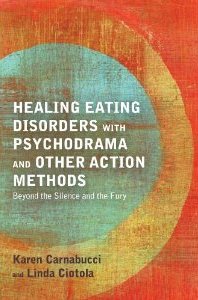|
By Karen Carnabucci, LCSW, TEP Traditional talk therapy helps the suffering person understand what contributes to his or her eating disorder or dissatisfaction with body image. However, conventional talk therapy usually leaves the person with the knowledge of “why” the eating disorder is present but without changing the behavior. Psychodrama, the action method developed by Dr. J.L. Moreno and his wife Zerka T. Moreno, teaches the importance of human problems in the context of the roles that are played out in life. With the opportunity to change these roles to more healthy behaviors, we have found that tremendous healing is available with psychodrama. With the perspective of roles, rather than pathological behaviors, we identify sufferers as the one who binges, the one who restricts food, the one who purges, the one who isolates, the one who is anxious, the one who diets, the one who fears being fat, and so on.  At the same time, we recognize that the people we work with are highly resourceful, with strengths, supporters and deep spiritual connections. A great part of their resilience and strength is that they contain additional roles within themselves – the observant one, the compassionate one, the caring one, the brave one – that can be fortified and expanded to address and solve problems with eating, diets and care for body. Pathologies are to be coped with and defeated; roles can be identified, sorted, rehearsed, changed and integrated – and bring a new life to a client with eating disorders or body distress. Entering eating disorder treatment is often difficult for the person with the eating disorder because the maladaptive behaviors in the use of food – restricting, bingeing, purging – are experienced as useful roles when dealing with emotional distress. Food, too, has roles to play – the one that numbs the body and the spirit, the one that distracts from underlying painful feelings, the one that fills the body with food as a substitute of nurturing to fill emotional needs. In addition, the individual’s belief system and behavior patterns – “the one who thinks that…” – and family dynamics – the daughter, the son, the spouse – join the interplay with this battleground. Further, several studies have established a correlation between eating disorders and emotional, physical and sexual abuse and other trauma. As we can see, all present a multitude of issues which must be addressed: fear of certain foods, body image distortions, problems with relationships, patterns of control, and mistrust, and painful memories stored within the body. As I point out in our book Healing Eating Disorders with Psychodrama and Other Action Methods: Beyond the Silence and the Fury written with co-author Linda Ciotola, psychodrama has proven itself to be very helpful. This experiential method supports people in moving out of their heads and into a fuller experience at which time they can experience problems and rehearse solutions in a new way. As suffering people employ creativity — with role play, art, movement, choice-making and imagery — they expand their sense of self and replace compulsion with creativity and internal safety. In eating disorder treatment, the client may be asked to make a special kind of social atom, a diagram noting important relationships, by charting foods that are “OK” and foods that are “forbidden” according to his or her rule system. The client can then observe more about his or her relationship with certain foods and often is able to identify the origins of these rules.l A similar exercise involves having the client complete a social atom showing significant people in her life and then circling or marking the people who enable or reinforce that person’s binge eating, restricting, purging or dieting. Identifying and role reversing with these foods, people and even cultural icons – such as the widely promoted Barbie doll – are very valuable. Here we can look at what supports our obsessions with unrealistic body images, and our clients can raise their consciousness about the silent but insidious messages of the culture. Role reversing with one’s food plan or self-help group also can assess and strengthen the internalized strength of these supports. Action approaches are varied as individual approaches or styles. The key is to allow the exploration of the roles that may have contributed to the role of the “eating disordered person” while also offering opportunities for healing the role the eating disorder serves. Role training offers the client opportunities to practice and integrate behaviors of true self care that substitutes for the coping value of the eating disorder.
0 Comments
Your comment will be posted after it is approved.
Leave a Reply. |
AuthorKaren Carnabucci, LCSW, TEP, is an author, trainer and psychotherapist who promotes, practices and teaches experiential methods including psychodrama, Family and Systemic Constellations, sand tray, mindfulness and Tarot imagery. Archives
December 2023
Categories
All
|

 RSS Feed
RSS Feed